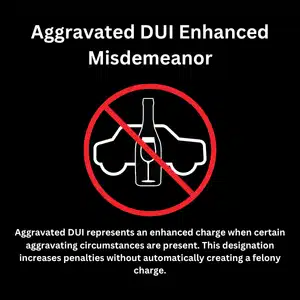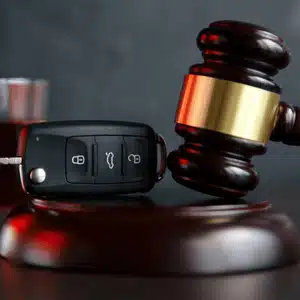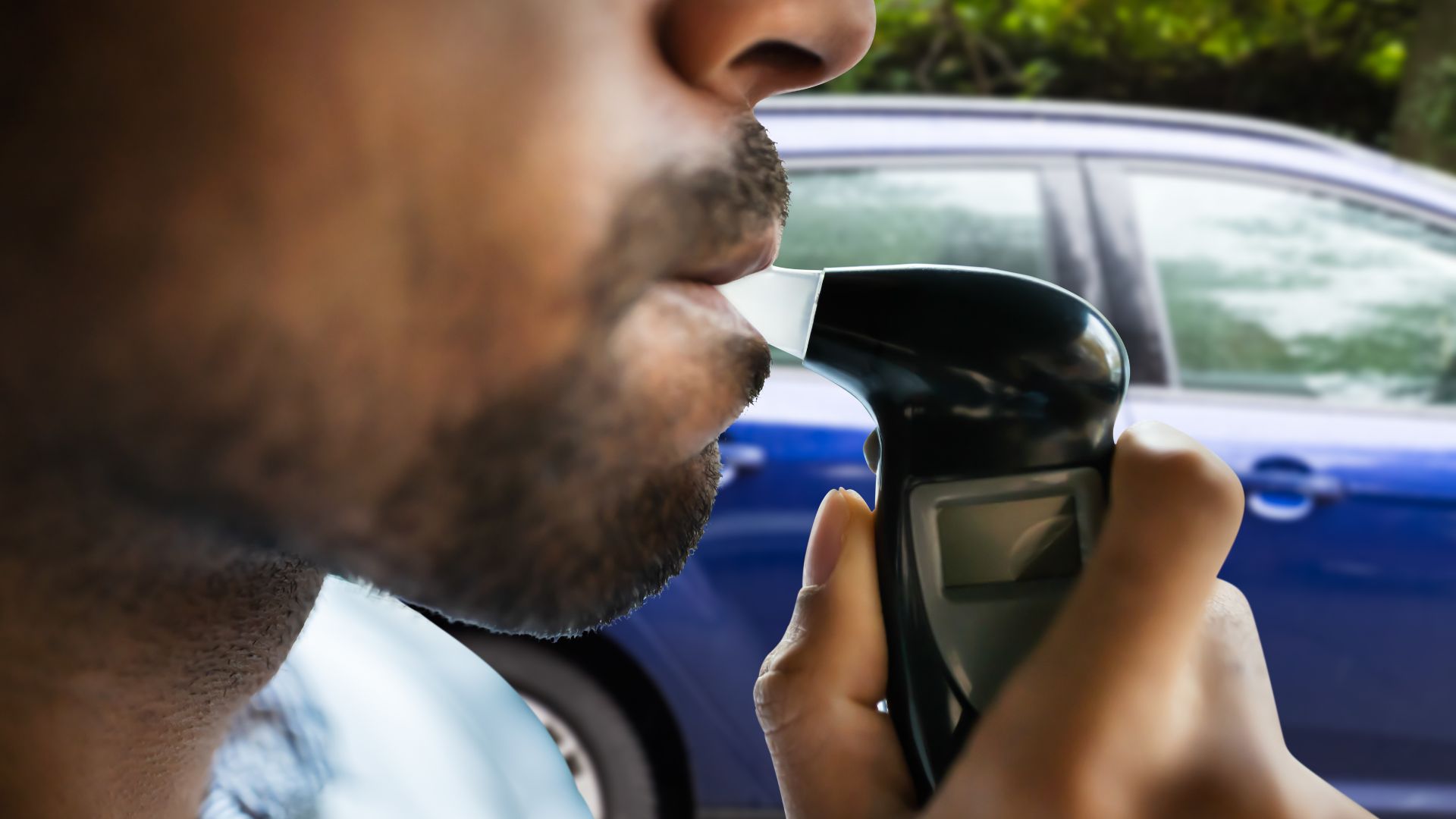Driving under the influence of alcohol carries serious legal consequences in Montana. The question many people ask, “Is a DUI a Felony in Montana?”. The answer depends on your prior DUI convictions and the specific circumstances of your case.
A DUI becomes a felony in Montana on the fourth or following offense. First, second, and third DUI convictions are misdemeanors under Montana’s DUI laws. However, repeat offenders face increasingly harsh penalties that can change their lives forever.
Montana takes drunk driving seriously. The state has structured its DUI penalties to punish repeat offenders more severely with each conviction. Understanding these laws can help you grasp the legal implications of a DUI charge in the Treasure State.
Misdemeanor vs. Felony DUI Classification
Montana’s DUI classification depends on prior DUI convictions. A first offense, second offense, and third offense are misdemeanors with jail time and fines but no prison. After more than four offenses offense, it becomes a serious offense with prison time and high DUI penalties.
Aggravated DUI applies to earlier offenses with factors like high blood alcohol concentration, actual physical control violations, or ignored ignition interlock device rules. Under Montana’s DUI laws, each DUI case conviction adds penalties.
A person’s driver’s license suspension and a possible treatment program follow are possible penalties. Montana department rules ensure offenders face lasting consequences.
Montana’s Legal Definition and BAC Limits

Montana law defines driving under the influence of alcohol in specific terms. A person commits DUI by driving or being in actual physical control of a vehicle while impaired by alcohol or drugs. This impairment must diminish their ability to safely operate the vehicle.
The state also enforces per se DUI laws based on blood alcohol concentration levels. These legal limits vary by driver type and situation.
For most drivers in a noncommercial vehicle, the legal limit is 0.08% BAC. Commercial motor vehicle operators face a stricter 0.04% limit. Underage drivers under 21 face a zero tolerance limit of 0.02% BAC.
Montana also sets a limit of 5 ng/ml of THC in blood for marijuana impairment. These per se limits mean you can be charged with DUI based solely on test results above these thresholds.
Actual physical control extends DUI laws beyond active driving. You can face charges for being behind the wheel while intoxicated, even in a parked car with keys accessible. This provision prevents impaired individuals from claiming they weren’t driving.
First DUI Offense Penalties
A first driving under the influence conviction in Montana is a misdemeanor with mandatory DUI penalties. Minimum jail time runs from 24 hours to up to six months, no sentence for the first 24 hours. Fines range from $600 to $1,000, doubled if a minor was present. A six-month driver’s license suspension applies, handled by the department.
A chemical dependency education course is required after a first DUI. You may qualify for a probationary driver’s license with an ignition interlock device. Montana driving laws require that all the evidence, including a breath sample or bodily substance test, be properly collected to determine a person’s alcohol concentration.
Montana’s DUI laws prohibit plea deals waiving these consequences, even for a first offense driving under the influence conviction. If a police officer observes impaired driving of a motor vehicle, they may request a breath sample, person’s blood, or other bodily substance test. Operating a motor vehicle under the influence of alcohol can result in swift legal penalties. Understanding Montana driving laws is essential to avoid the severe impact of a DUI conviction.
Second DUI Offense Enhanced Penalties
A second offense DUI conviction in Montana triggers enhanced punishments. Mandatory jail time ranges from seven days to one year; no conditional sentence allowed for the first week. Fines increase to $1,200–$2,000, doubled if a minor was present. A one-year license suspension applies, with no driving for 45 days.
Chemical dependency treatment, beyond an education course, becomes mandatory. A treatment court program may also be required, depending on the court’s discretion and the offender’s prior convictions. A probationary license with an ignition interlock device may be allowed after court approval. Most offenders must join Montana’s 24/7 Sobriety Program to monitor for diminished ability caused by alcohol or drugs.
Montana law under code ann §61-8-714 defines this specific offense as a serious repeat violation. Offenders may be required to submit to testing of person’s blood or other bodily substance to assess impairment. A second offense DUI establishes a pattern of impaired driving behavior, increasing legal consequences. Operating under diminished ability to maintain control of a vehicle carries severe risks and penalties, and Montana courts take prior convictions into account during sentencing.
Third DUI Offense Serious Consequences

A third offense DUI conviction in Montana brings severe DUI penalties. Mandatory jail time starts at 30 days, up to one year. Fines climb to $2,500–$5,000, doubled if a minor is present. Under code ann §61-8-731, punishment increases significantly for repeat offenders.
License suspension is one year, with no probationary license for at least 90 days. Intensive chemical dependency treatment is required. Courts typically impose treatment court program participation and 24/7 monitoring post-release for a certain period.
Before conviction, field sobriety tests often play a key role in establishing impairment. Results from these tests help prosecutors prove a DUI charge. This signals a grave offense under DUI laws, reflecting both the danger posed by impaired driving and the need for stricter interventions.
Montana’s legal framework ensures that a third offense DUI is treated with utmost seriousness, with punishment increases aimed at both deterring future violations and promoting rehabilitation.
Fourth or Subsequent Offense: Felony Territory
A fourth or Subsequent DUI transforms your charge into a felony. This escalation brings severe consequences including mandatory state prison time.
Montana classifies someone with three prior DUI convictions who commits another DUI as guilty of a felony. The case moves to district court under felony sentencing guidelines.
Prison time becomes mandatory at 13 months minimum. This sentence is served with the Montana Department of Corrections, not county jail. The law provides for 13 months to two years in a correctional facility or treatment program.
An additional five-year suspended sentence hangs over felony DUI offenders. This suspended time can be imposed if they violate probation or fail treatment requirements. The initial 13-month term cannot be deferred, suspended, or paroled.
Fines for felony DUI range from $5,000 to $10,000. Courts may also order payment for imprisonment costs, treatment expenses, and probation supervision.
Driver’s license consequences become severe for felony offenders. During probation, vehicle operation requires probation officer authorization and ignition interlock devices. License suspension typically lasts at least one year with very limited privileges afterward.
Aggravated DUI Enhanced Misdemeanor

Aggravated DUI represents an enhanced charge when certain aggravating circumstances are present. This designation increases penalties without automatically creating a felony charge.
High blood alcohol concentration of 0.16% or higher triggers aggravated status. This level is double the legal limit and shows extremely dangerous impairment.
Driving with an ignition interlock restriction while operating a vehicle without the required device creates aggravated charges. This situation shows deliberate violation of court orders or probation conditions.
License suspension for a prior DUI or refusal makes any new DUI automatically aggravated. This factor shows continued disregard for DUI consequences and public safety.
Aggravated DUI convictions carry higher mandatory minimums. First aggravated offenses require two days minimum jail time and $1,000 minimum fines. Second aggravated offenses need 15 days minimum, while third require 40 days minimum.
Courts must impose additional conditions for aggravated DUI including treatment court participation if available and 24/7 sobriety monitoring. No sentence deferral is allowed even for first aggravated offenses.
Underage DUI Zero Tolerance Policy
Montana enforces strict zero tolerance for underage drinking and driving. Drivers under 21 face DUI charges with just 0.02% BAC or higher.
This extremely low limit means virtually any alcohol consumption can result in charges. The law essentially prohibits any measurable alcohol for minor drivers.
Underage DUI convictions typically don’t count as prior offenses for adult DUI enhancement. This policy prevents youthful mistakes from permanently branding someone as a repeat offender.
Penalties for underage DUI are lighter than adult consequences. First violations carry $100 to $500 fines and 90-day license suspensions. Second violations increase to $200 to $500 fines and six-month suspensions.
Third underage violations result in $300 to $500 fines and one-year license suspensions. Jail time becomes possible for offenders aged 18 to 20, starting with 48 hours minimum for second offenses.
Chemical dependency education remains mandatory for all underage offenders. Treatment requirements increase with subsequent DUI violations to address developing substance abuse patterns.
Implied Consent and Chemical Testing
Montana’s implied consent law requires drivers to submit to chemical testing when lawfully requested. Operating a vehicle on Montana roads means you automatically consent to alcohol or drug testing.
Officers typically request evidentiary breath or blood tests after DUI arrests. These official tests differ from roadside preliminary breath tests used for probable cause.
You have the right to refuse chemical testing, but refusal carries automatic consequences. First refusals trigger six-month license suspensions. Second refusals within five years result in one-year suspensions.
Refusal suspensions are separate from criminal DUI penalties. No probationary or hardship licenses are available during refusal suspension periods. Reinstatement requires a $300 fee.
Refusal can be used as evidence of guilt in court. Prosecutors may argue that defendants refused because they knew they were intoxicated. Officers can also seek search warrants for blood draws in certain circumstances despite refusal.
Commercial Driver Considerations
Commercial drivers face stricter DUI standards and more severe consequences. Federal regulations adopted by Montana create penalties for CDL holders.
The legal limit for commercial motor vehicle operation is 0.04% BAC. Personal vehicle DUI arrests also affect commercial driving privileges even when off duty.
DUI convictions or implied consent refusals are major offenses for CDL holders. First major offenses trigger minimum one-year CDL disqualifications. Hazmat endorsements face three-year minimums.
Second major offenses result in lifetime CDL disqualification. While reinstatement applications are possible after 10 years, most second DUI convictions effectively end commercial driving careers.
These consequences apply regardless of which state the DUI occurs in. CDL holders face professional consequences for any DUI conviction anywhere in the country.
Treatment Court Alternative Programs

Montana offers DUI treatment courts as alternatives to traditional sentencing for repeat offenders. These specialized programs combine intensive supervision with substance abuse treatment.
Treatment court participants must plead guilty but receive sentences while completing program requirements. Successful completion satisfies much of the original punishment beyond mandatory minimums.
Program requirements include frequent court appearances, random testing, and strict compliance with all conditions. Failure in treatment court results in imposition of the original sentence.
Treatment courts are typically available for second and third offenders. Some jurisdictions offer these programs as alternatives to felony DUI prison sentences for fourth-time offenders.
Understanding the Consequences
Montana’s DUI laws create escalating consequences designed to deter repeat offenses. While first-time offenders face serious misdemeanor penalties, the consequences become life-changing for repeat violators.
A DUI conviction affects more than just criminal penalties. Insurance rates increase dramatically. Employment opportunities may be limited, especially for positions requiring driving. Professional licenses can be affected or revoked.
The best approach is avoiding DUI charges entirely through responsible decision-making. However, if you face charges, understanding these consequences helps you make informed decisions about your defense and future.
Montana’s message is clear: repeat offenses will not be tolerated. The fourth or successive offense brings felony charges with mandatory prison time. By that point, the consequences extend far beyond fines and license suspension to fundamental changes in your legal status and future opportunities.









